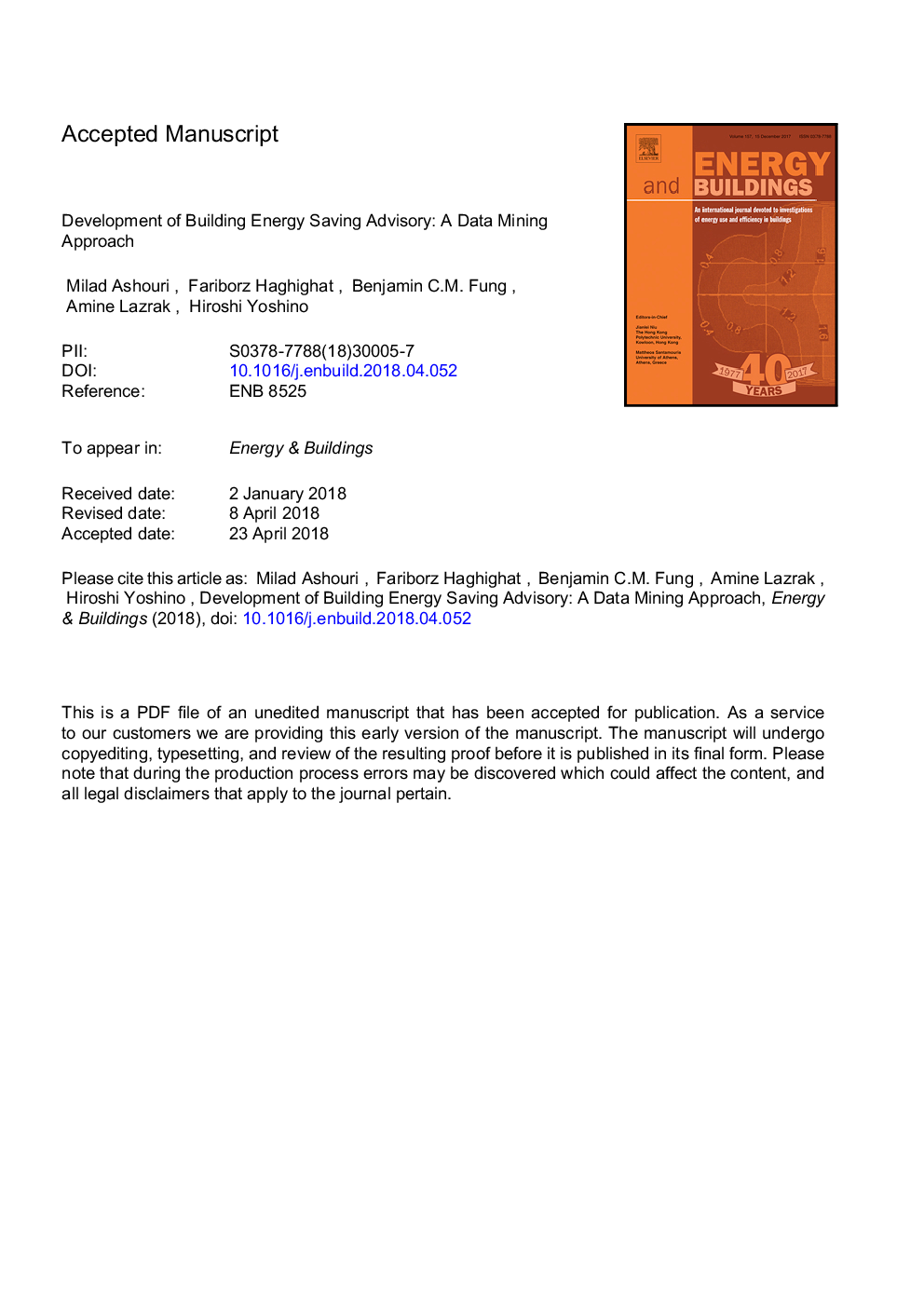| کد مقاله | کد نشریه | سال انتشار | مقاله انگلیسی | نسخه تمام متن |
|---|---|---|---|---|
| 6727411 | 1428918 | 2018 | 45 صفحه PDF | دانلود رایگان |
عنوان انگلیسی مقاله ISI
Development of building energy saving advisory: A data mining approach
ترجمه فارسی عنوان
توسعه مشاوره صرفه جویی در انرژی ساختمان: روش داده کاوی
دانلود مقاله + سفارش ترجمه
دانلود مقاله ISI انگلیسی
رایگان برای ایرانیان
کلمات کلیدی
رفتار شغلی، داده کاوی، ساختمان انرژی،
ترجمه چکیده
رفتار شهروندان و تعامل آنها با لوازم خانگی برای ارزیابی مصرف انرژی ساختمان بسیار مهم است. این مطالعه یک روش جدید برای نظارت بر مصرف انرژی در ساختن بارهای نهایی برای ایجاد یک سیستم مشاوره ارائه می دهد. سیستم ساخته شده به مسافران برای اقدامات خاص (توصیه های اولویت بندی شده) برای کاهش مصرف انرژی بارهای نهایی استفاده می کند. اندازهگیری پس انداز بالقوه نیز براساس موارد ذکر شده ارائه شده است. روش پیشنهادی همچنین قادر به ارزیابی صرفه جویی های انرژی انجام شده توسط اشخاص می باشد. این سیستم بر اساس تجزیه و تحلیل داده های تاریخی تولید شده اشخاص با استفاده از تکنیک های داده کاوی برای تولید توصیه های بسیار قابل قبول کار می کند. برای اهداف تظاهرات، این روش بر روی داده های واقعی یک ساختمان در ژاپن آزمایش شد. این مجموعه شامل مصرف انرژی دقیق بارهای نهایی، به عنوان تامین آب گرم، نورپردازی، آشپزخانه، یخچال و فریزر، سرگرمی و اطلاعات، کارهای خانه و بهداشت، و دیگران است. نتایج نشان می دهد که مدل های توسعه یافته دقیق هستند و می توان با صرفه جویی در مصرف عادات مصرف انرژی اشخاص، تا 21٪ کل مصرف انرژی صرفه جویی کرد.
موضوعات مرتبط
مهندسی و علوم پایه
مهندسی انرژی
انرژی های تجدید پذیر، توسعه پایدار و محیط زیست
چکیده انگلیسی
Occupants' behavior and their interaction with home appliances are crucial for assessing building energy consumption. This study proposes a new methodology for monitoring the energy consumed in building end-use loads to build an advisory system. The built system alerts occupants to take certain measures (prioritized recommendations) to reduce energy consumption of end-use loads. The quantification of potential savings is also provided upon following said measures. The proposed methodology is also capable of evaluating the energy savings performed by the occupants. The system works based on the analysis of historical data generated by occupants using data mining techniques to output highly feasible recommendations. For demonstration purposes, the methodology was tested on the real dataset of a building in Japan. The dataset includes detailed energy consumption of end-use loads, categorized as hot water supply, lighting, kitchen, refrigerator, entertainment & information, housework & sanitary, and others. Results suggest that the developed models are accurate, and that it is possible to save up to 21% of total energy consumption by only changing occupants' energy use habits.
ناشر
Database: Elsevier - ScienceDirect (ساینس دایرکت)
Journal: Energy and Buildings - Volume 172, 1 August 2018, Pages 139-151
Journal: Energy and Buildings - Volume 172, 1 August 2018, Pages 139-151
نویسندگان
Milad Ashouri, Fariborz Haghighat, Benjamin C.M. Fung, Amine Lazrak, Hiroshi Yoshino,
